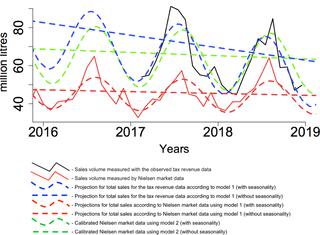PLOS Medicine ( IF 10.5 ) Pub Date : 2020-03-12 , DOI: 10.1371/journal.pmed.1003036 Francisco Goiana-da-Silva 1 , Milton Severo 2, 3 , David Cruz E Silva 4 , Maria João Gregório 5, 6 , Luke N Allen 7 , Magdalena Muc 8 , Alexandre Morais Nunes 9 , Duarte Torres 3, 6 , Marisa Miraldo 10, 11 , Hutan Ashrafian 12 , Ana Rito 13 , Kremlin Wickramasinghe 14 , João Breda 14 , Ara Darzi 12 , Fernando Araújo 15 , Carla Lopes 2, 3

|
Background
Excessive consumption of sugar has a well-established link with obesity. Preliminary results show that a tax levied on sugar-sweetened beverages (SSBs) by the Portuguese government in 2017 led to a drop in sales and reformulation of these products. This study models the impact the market changes triggered by the tax levied on SSBs had on obesity incidence across various age groups in Portugal.
Methods and findings
We performed a national market analysis and population-wide modelling study using market data for the years 2014–2018 from the Portuguese Association of Non-Alcoholic Drinks (GlobalData and Nielsen Consumer Panel), dietary data from a national survey (IAN-AF 2015–2016), and obesity incidence data from several cohort studies. Dietary energy density from SSBs was calculated by dividing the energy content (kcal/gram) of all SSBs by the total food consumption (in grams). We used the potential impact fraction (PIF) equation to model the projected impact of the tax-triggered change in sugar consumption on obesity incidence, through both volume reduction and reformulation. Results showed a reduction of 6.6 million litres of SSBs sold per year. Product reformulation led to a decrease in the average energy density of SSBs by 3.1 kcal/100 ml. This is estimated to have prevented around 40–78 cases of obesity per year between 2016 and 2018, with the biggest projected impact observed in adolescents 10 to <18 years old. The model shows that the implementation of this tax allowed for a 4 to 8 times larger projected impact against obesity than would be achieved though reformulation alone. The main limitation of this study is that the model we used includes data from various sources, which can result in biases—despite our efforts to mitigate them—related to the methodological differences between these sources.
Conclusions
The tax triggered both a reduction in demand and product reformulation. These, together, can reduce obesity levels among frequent consumers of SSBs. Such taxation is an effective population-wide intervention. Reformulation alone, without the decrease in sales, would have had a far smaller effect on obesity incidence in the Portuguese population.
中文翻译:

葡萄牙含糖饮料税对不同年龄组肥胖发生率的预计影响:建模研究。
背景
过量摄入糖与肥胖有着明确的联系。初步结果显示,葡萄牙政府于 2017 年对含糖饮料 (SSB) 征税,导致这些产品的销量下降并重新调整配方。本研究模拟了对 SSB 征税引发的市场变化对葡萄牙各年龄段肥胖发生率的影响。
方法和结果
我们使用葡萄牙非酒精饮料协会(GlobalData 和 Nielsen Consumer Panel)提供的 2014-2018 年市场数据、来自全国调查的饮食数据(IAN-AF 2015- 2016),以及来自多项队列研究的肥胖发生率数据。 SSB 的膳食能量密度是通过将所有 SSB 的能量含量(千卡/克)除以总食物消耗量(以克为单位)来计算的。我们使用潜在影响分数(PIF)方程来模拟税收引发的糖消费变化对肥胖发病率的预计影响,通过减少数量和重新配制。结果显示,SSB 的销量每年减少 660 万升。产品重新配方导致 SSB 的平均能量密度降低 3.1 kcal/100 ml。据估计,2016 年至 2018 年间,每年可预防约 40-78 例肥胖病例,预计影响最大的是 10 岁至 18 岁以下的青少年。该模型显示,与单独重新制定税收相比,实施这项税收对肥胖的预期影响要大 4 到 8 倍。这项研究的主要局限性在于,我们使用的模型包含来自各种来源的数据,这可能会导致与这些来源之间的方法差异相关的偏差(尽管我们努力减轻这些偏差)。
结论
该税收引发了需求减少和产品配方的重新调整。这些共同作用可以降低经常食用 SSB 的人的肥胖水平。这种税收是一种有效的全民干预措施。如果不减少销量,仅调整配方对葡萄牙人口肥胖率的影响要小得多。











































 京公网安备 11010802027423号
京公网安备 11010802027423号